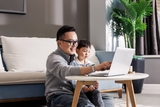DOVE Center for Voiding and Bladder Function

We understand how upsetting it can be when your child has frequent urinary tract infections, wetting accidents and/or constipation. We are here for you with the answers and advanced treatment options you and your child need for a more comfortable life.
The DOVE Center is one of the largest, most comprehensive clinics in the United States devoted to pediatric bladder and urinary tract dysfunction. We are part of the world-class Division of Urology at Children's Hospital of Philadelphia. Each member of our team is specially trained to care for children suffering from these conditions. We work together to sort out what is causing these problems for your child and develop a plan to correct them.
How we serve you
Your child's team in the DOVE Center is made up of specialists who are experts in diagnosis and treatment of these conditions. They are also involved in developing new ways to manage them.
Conditions we treat
We treat the full range of conditions that cause pediatric bladder and urinary tract dysfunction.
-
Bedwetting -
Constipation -
Daytime wetting -
Dysfunctional voiding - Infrequent voiding (voiding postponement)
- Painful urination
-
Urinary frequency - Urinary hesitancy
-
Urinary tract infection (UTI) -
Urinary urgency (overactive bladder)

Why choose us
Our DOVE Center is one of the largest, most comprehensive clinics in the United States devoted to pediatric bladder and urinary tract dysfunction.

Meet your team
Here at the DOVE Center, your child's care is in the hands of one of the largest, most experienced teams devoted to pediatric bladder and urinary tract dysfunction. We will help you manage this condition.

Our location
We are located at the Buerger Center for Advanced Pediatric Care (Main Hospital).

Our research
Our researchers use information from our laboratories and from real-life experiences of patients at our center to create better treatments and better outcomes.

Resources
We have created resources to help you find answers to your questions and feel confident in the care you are providing your child.

Prepare for your appointment
See what to expect during your child's care with the Dysfunctional Outpatient Voiding Education (DOVE) Center at Children's Hospital of Philadelphia.
Your donation changes lives
A gift of any size helps us make lifesaving breakthroughs for children everywhere.
